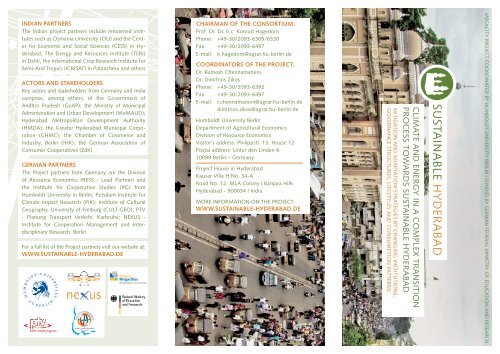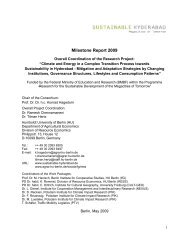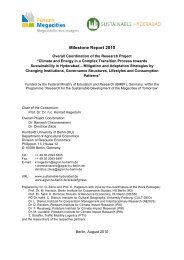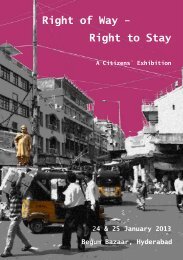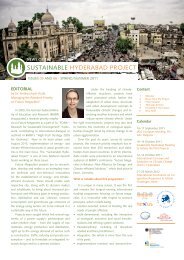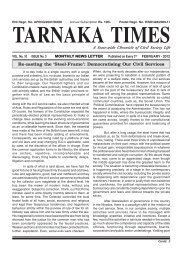Project-Flyer - Sustainable Hyderabad
Project-Flyer - Sustainable Hyderabad
Project-Flyer - Sustainable Hyderabad
Create successful ePaper yourself
Turn your PDF publications into a flip-book with our unique Google optimized e-Paper software.
INDIAN PARTNERS<br />
The Indian project partners include renowned institutes<br />
such as Osmania University (OU) and the Center<br />
for Economic and Social Sciences (CESS) in <strong>Hyderabad</strong>,<br />
The Energy and Resources Institute (TERI)<br />
in Dehli, the International Crop Research Institute for<br />
Semi-Arid Tropics (ICRISAT) in Patancheru and others<br />
ACTORS AND STAKEHOLDERS<br />
Key actors and stakeholders from Germany and India<br />
comprise, among others, of the Government of<br />
Andhra Pradesh (GoAP); the Ministry of Municipal<br />
Administration and Urban Development (MoMAUD);<br />
<strong>Hyderabad</strong> Metropolitan Development Authority<br />
(HMDA); the Greater <strong>Hyderabad</strong> Municipal Corporation<br />
(GHMC); the Chamber of Commerce and<br />
Industry, Berlin (IHK); the German Association of<br />
Consumer Cooperatives (ZdK)<br />
GERMAN PARTNERS<br />
The <strong>Project</strong> partners from Germany are the Division<br />
of Resource Economics (RESS - Lead Partner) and<br />
the Institute for Cooperative Studies (IfG) from<br />
Humboldt University in Berlin; Potsdam Institute for<br />
Climate Impact Research (PIK); Institute of Cultural<br />
Geography, University of Freiburg (CULT-GEO); PTV<br />
- Planung Transport Verkehr, Karlsruhe; NEXUS -<br />
Institute for Cooperation Management and Interdisciplinary<br />
Research, Berlin<br />
For a full list of the <strong>Project</strong> partners visit our website at:<br />
WWW.SUSTAINABLE-HYDERABAD.DE<br />
CHAIRMAN OF THE CONSORTIUM:<br />
Prof. Dr. Dr. h.c. Konrad Hagedorn<br />
Phone: +49-30/2093-6305/6320<br />
Fax: +49-30/2093-6497<br />
E-mail: k.hagedorn@agrar.hu-berlin.de<br />
COORDINATORS OF THE PROJECT:<br />
Dr. Ramesh Chennamaneni<br />
Dr. Dimitrios Zikos<br />
Phone: +49-30/2093-6392<br />
Fax: +49-30/2093-6497<br />
E-mail: r.chennamaneni@agrar.hu-berlin.de<br />
dimitrios.zikos@agrar.hu-berlin.de<br />
Humboldt University Berlin<br />
Department of Agricultural Economics<br />
Division of Resource Economics<br />
Visitor’s address: Philippstr. 13, House 12<br />
Postal address: Unter den Linden 6<br />
10099 Berlin – Germany<br />
<strong>Project</strong> House in <strong>Hyderabad</strong><br />
Kausar Villa H.No. 34-A<br />
Road No. 12, MLA Colony | Banjara Hills<br />
<strong>Hyderabad</strong> - 500034 | India<br />
MORE INFORMATION ON THE PROJECT:<br />
WWW.SUSTAINABLE-HYDERABAD.DE<br />
Foto: Kishor Krishnamoorthi<br />
MITIGATION AND ADAPTATION STRATEGIES BY CHANGING INSTITUTIONS,<br />
GOVERNANCE STRUCTURES, LIFESTYLES AND CONSUMPTION PATTERNS<br />
CLIMATE AND ENERGY IN A COMPLEX TRANSITION<br />
PROCESS TOWARDS SUSTAINABLE HYDERABAD<br />
SUSTAINABLE HYDERABAD<br />
MEGACITY PROJECT COORDINATED BY HUMBOLDT UNIVERSITY BERLIN | FUNDED BY GERMAN FEDERAL MINISTRY OF EDUCATION AND RESEARCH
RESEARCH OBJECTIVES<br />
The <strong>Project</strong> integrates concepts of institutional, economic,<br />
political and technological change to achieve the following<br />
specific research objectives:<br />
• To develop specific knowledge and a rich data base on<br />
climate change, mitigation and adjustment opportunities,<br />
energy efficiency and bio-energy in <strong>Hyderabad</strong><br />
• To formulate a “<strong>Sustainable</strong> Development Framework”<br />
for the metropolitan area Greater <strong>Hyderabad</strong> with priority<br />
on mitigation and adjustment strategies<br />
• To foster generation and application of local knowledge<br />
to initiate institutional innovation and governance reforms<br />
that support sustainability objectives<br />
• To develop strategies of communication and co-operation<br />
between policy makers and stakeholders, also addressing<br />
gender issues<br />
• To come up with a “<strong>Sustainable</strong> Urban Food and Health<br />
System” to meet the nutritional and health demands of a<br />
growing population, coping in parallel with the adverse<br />
effects of climate change and energy scarcity<br />
• To design institutional and policy solutions for “<strong>Sustainable</strong><br />
Environmental Management”, focusing on climate<br />
and energy in urban and peri-urban regions<br />
• To formulate an action plan based on energy efficiency,<br />
mitigation and adaptation strategies for climate change<br />
with special reference to food, bio-energy, health and<br />
environmental management<br />
• To secure adoption of the action plan by politicians, agencies,<br />
groups and firms by employing cooperation mechanisms<br />
and capacity building measures<br />
• To set up an advanced programme for excellent academic<br />
education of PhD students and Post-docs<br />
APPLICATION PERSPECTIVES<br />
The <strong>Project</strong> aims at the following knowledge-based innovations:<br />
• To develop a <strong>Sustainable</strong> Development Framework (SDF)<br />
which focuses on mitigation and adaptation strategies for<br />
climate change as well as energy provision and efficiency<br />
• Based on that, to design a strategy for a Perspective Action<br />
Plan (PAP), focusing on the resolution of these problems,<br />
including related core issues concerning nutrition, health,<br />
environment and natural resources<br />
• To implement selected Pilot <strong>Project</strong>s at the community<br />
level and organise learning processes for their adoption by<br />
setting up appropriate institutions and governance structures<br />
that enable fruitful policies and technologies<br />
ABOUT THE PROJECT<br />
The focus of the <strong>Project</strong> is the South Indian emerging Megacity<br />
of “Greater <strong>Hyderabad</strong>”, which is expected to reach 10.5<br />
million inhabitants by 2015. Driven by consumption and lifestyle<br />
changes, per capita greenhouse gas emissions are constantly<br />
increasing in the emerging Megacity. The use of traditional<br />
biomass for fuel (e.g. firewood) is high in peri-urban<br />
areas; at the same time, modernization and urbanization processes<br />
have led to a growth of commercial energy and indirect<br />
energy uses, e.g. of energy embodied in products and services,<br />
indicating <strong>Hyderabad</strong>’s shift towards a modern consumer society.<br />
Severe floods in 2002, strong heat waves in 2003 and<br />
altogether three drought years between 2000 and 2007 have<br />
caused serious damage to human life, property and economic<br />
advancement. Therefore, the role of climate change in everyday<br />
life of the people in <strong>Hyderabad</strong> has become a central<br />
issue that the <strong>Project</strong> aims to explore and contribute to the<br />
resolution of the arising problems. This requires commitment<br />
of numerous actors to subscribe to institutions of sustainability,<br />
which the <strong>Project</strong> encourages by organizing discourses for<br />
changing the rules-in-use.


